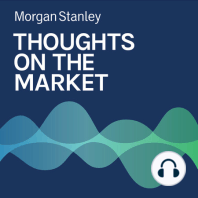3 min listen
Vishy Tirupattur: Debating the Outlook
ratings:
Length:
4 minutes
Released:
Nov 27, 2023
Format:
Podcast episode
Description
Morgan Stanley published its 2024 macroeconomic and investment outlooks last week after spirited debates among our economists and strategists. Three topics animated much of this year’s discussion: lingering concerns about recession; China; and the challenging real estate market in the U.S.----- Transcript -----Welcome to Thoughts on the Market. I am Vishy Tirupattur, Morgan Stanley's Chief Fixed Income Strategist. Along with my colleagues, bringing you a variety of perspectives, I'll be talking about some of the key debates we engaged in during our year ahead outlook process. It's Monday, November 27th at 10 a.m. in New York. We published our Year Ahead Global Economics and Strategy Outlook last Sunday and more detailed asset class and country specific outlooks have been streaming out since. At Morgan Stanley Research the outlooks are the culmination of a process involving much deliberation and spirited debate among economists and strategists across all regions and asset classes we cover. While we strive for cohesion and consistency in our outlook across economies and markets, we are convinced that in a highly interconnected world, facing numerous uncertainties, challenging each other's views makes the final product much stronger. In that spirit, here are some of the key debates we engaged in along the way. Slowdown but not recession? In their baseline scenario, our economists expect a significant slowdown in developed market economies while inflation is tamed and outright recession is avoided. Unsurprisingly, the prospect of a substantial slowdown that does not devolve into a recession was debated at length. Our economists maintain that while recessions remain a risk everywhere, they expect any recession, such as the one in the United Kingdom, to be shallow. Since inflation is falling with full employment, real incomes should hold up, leaving consumption resilient despite more volatile investment spending. Our economists call for policy easing to start across several DM economies in the middle of 2024 was also much discussed. For the U.S., our economists call for 100 basis points of rate cuts starting around the second half of the year and the cuts begin even before inflation target has been achieved and without a spike in the unemployment rate. The motivation here is not that the Fed will cut to stimulate the economy, but the cuts are a move towards a more normalized monetary policy. As the economy begins to slow and net new jobs created fall below replacement levels, we think that the Fed sees the need to normalize policy instead of maintaining policy at very restrictive levels. The China question. Relative to the expectations in our mid-year outlook, China growth surprised to the downside. We clearly overestimated the ability and willingness of China policymakers to restore vigor to the economy. Thus, as we debated China, we spent time on the policy measures needed to offset the drag from the looming 3D trap of debt, deflation and demographics. We look for subpar improvement in both growth and inflation in 2024, with real GDP growth reaching a below consensus 4.2%. More central government led stimulus will only cushion the economy against continued deleveraging in the housing sector and local government financial vehicles.Real estate challenges. U.S. residential and commercial real estate markets diverged dramatically over the course of 2023, and their trajectory in the year ahead was an important debate. The dramatic affordability challenges posed by higher mortgage rates caused a significant pullback in existing home sales, renewing decreases in inventory that provided near-term support for home prices. On the other hand, the combination of challenges for key lenders such as regional banks and secular challenges to select property types such as offers coupled with an imminent and persistent wall of maturities that need to be refinanced, drove commercial real estate prices and sales meaningfully lower. Looking ahead, as r
Released:
Nov 27, 2023
Format:
Podcast episode
Titles in the series (100)
Mike Wilson: How Confident Are U.S. Businesses in the Economy? by Thoughts on the Market
